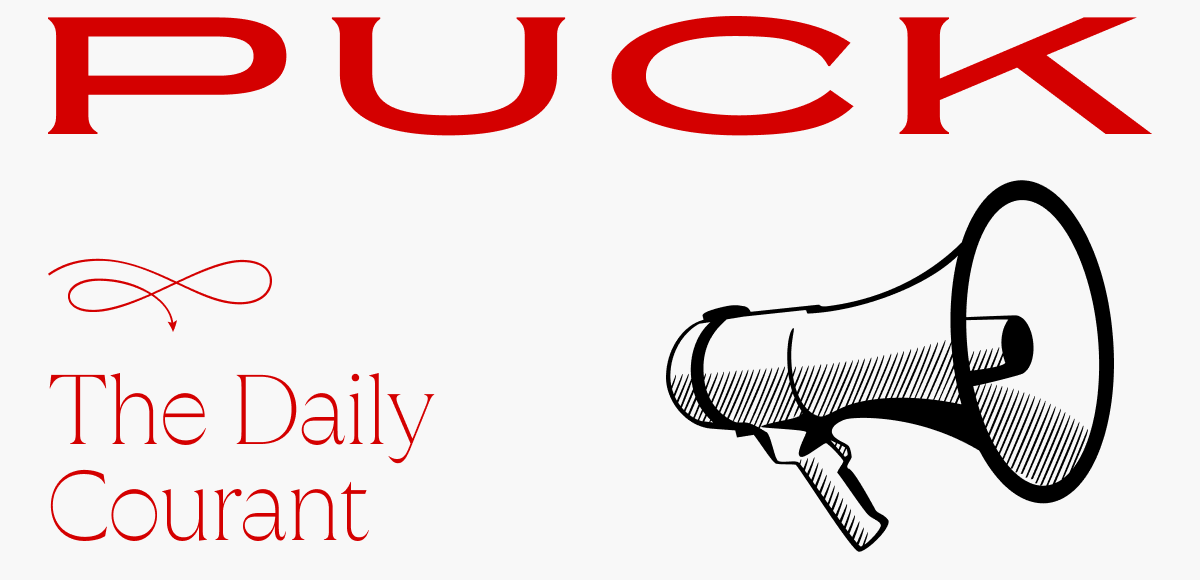
|
PREVIEW VERSION
|
|
|
|
Baron’s WaPo Warning, Trump vs. Tim
Scott, MSNBC in Revolt
|
Happy Monday and welcome back to The Daily Courant, your afternoon
memo featuring Puck’s latest reporting.
First up today, Bill Cohan digs into the remarkably rosy Q4 earnings report for David Zaslav’s Warner Bros. Discovery, and slips on his green eyeshades to scrutinize whether a raft of positive data points—strong D.T.C. and studio division performance, $19 billion of debt paid off—signals that Zaz’s media machine has maybe,
finally, turned a corner.
Plus, below the fold: Dylan Byers and former NBC News president Noah Oppenheim go deep on the troubles inside 30 Rock. Leigh Ann Caldwell measures the rift between Trump and the Tim Scott–led National Republican Senatorial Committee. Marion Maneker chronicles Artnet’s
14-hour, Jerry Springer–esque annual general meeting. And Sarah Shapiro uncovers a retail bright spot in an otherwise macabre landscape.
Meanwhile, on the pods: John Heilemann connects with the legendary former Washington Post executive editor Marty Baron on Impolitic to discuss how Jeff Bezos learned to love Trump. On The Varsity, John
Ourand and Men in Blazers founder Roger Bennett debate whether the 2026 World Cup will find a happy home in the U.S. And on The Powers That Be, Jon Kelly and Peter Hamby chew over Bezos’s controversial decision to refashion the Post’s Opinion section.
|
|
|

|
William D. Cohan
|
|
Back in April 2022, Warner Bros. Discovery came into the world with a slew of near-existential
disadvantages—but if WBD’s Q4 2024 performance is a harbinger of things to come, the worst may be over. The latest earnings report revealed that Zaz and his hatchet man, Gunnar Wiedenfels, shaved WBD’s net debt down to $34.6 billion; the D.T.C. unit reported adjusted EBITDA of $677 million for 2024, up exponentially from $103 million the year before; and Zaz has signaled harder than ever that he’s willing to kill his darlings from Discovery. Investor sentiment seems to be responding: In the past
six months, the stock is up 51 percent, even though it’s still down 55 percent since the company was formed. So is the glass half empty or half full?
Read Now
|
|
|

|
Dylan Byers
|
|
In the past week, NBCUniversal’s now-splintering news empire endured some significant ruptures:
Lester Holt announced his long-anticipated resignation at Nightly News, new MSNBC president Rebecca Kutler unveiled a slate of very notable programming changes, and in response, Rachel Maddow took it upon herself to put Kutler and SpinCo chief Mark Lazarus on blast on behalf of the 30 Rock proletariat. Amid the upheaval, Dylan met with former NBC News president Noah Oppenheim, who left the NBC mothership two years ago, to talk about Maddow, Lester, the sordid state of the legacy media
industry, and much more.
Read Now
|
|
|
A MESSAGE FROM OUR SPONSOR
|
This is how bp does convenience
bp added $130+ billion to
the US economy over the last two years. Like adding more than 300 TravelCenters of America sites to our retail network. With our on-highway locations spanning the entire US, we can bring more quality fuel, charging and food to customers. It’s just one of the ways bp is
investing in America.
|
|
|

|
Leigh Ann Caldwell
|
|
In early February, shortly after Donald Trump’s inauguration, two of his top political aides
were invited to Capitol Hill, where they delivered an early warning sign to Republican chiefs of staff: Without Trump on the ballot, their best chance of winning reelection would be to fully embrace the president’s agenda. Of course, Trump wants to leverage the next election cycle to ensure that Republicans move with him in lockstep—but the president is also keenly aware that the clock is ticking on his party’s power trifecta in Washington. If Republicans lose the House or Senate in
2026, the final two years of Trump’s second-term legacy project will presumably grind to a halt. Meanwhile, there’s unresolved tension between the Trump team and the new head of the National Republican Senatorial Committee: Senator Tim Scott.
Read
Now
|
|
|

|
Marion Maneker
|
|
The long-running battle for control of Artnet, the art media and auction data company, finally
came to a head Thursday during the annual general meeting in Berlin, which lasted 14 hours and caused the stock to drop by 20 percent. At the shareholder event, grievances were aired, tables were pounded, and one shareholder even complained the company wasn’t doing enough to protect him from the Spanish aristocrat sitting beside him. (The aristocrat happened to be the husband of prospective board member Sophie Neuendorf, who was, he claimed, trying to intimidate him.) The meeting has left the
company more gutted than ever, and neutered the ruling Neuendorf clan. And yet, the only certainty for the beleaguered company is that this shitshow will play on. Here’s Marion on the aftereffects…
Read Now
|
|
|

|
Sarah Shapiro
|
|
With department stores going dark across the country, Mitchells, the Connecticut-based,
family-owned chain, is expanding its retail footprint in Northern California. Sure, it’s just one store, but the new Wilkes-Bashford location in Palo Alto suggests Mitchells is onto something with its strategy of targeting underserved luxury markets while refusing to overexpand. In an industry racing toward digitization, Mitchells has doubled down on what algorithms can’t (yet) replicate: deeply localized understanding of their specific customer base in each market they serve. Meanwhile,
Lululemon announced an alliance with Lewis Hamilton, ballet-inspired sneakers are back, and the market is responding with alternatives to $1,000 cashmere shirts.
Read Now
|
|
|

|
John Heilemann
|
|
John is joined by Marty Baron to discuss the changes being wrought by Jeff Bezos at The
Washington Post, where Baron served as executive editor from 2013 to 2021, and how the Fourth Estate is faring in the Trump 2.0 era. Baron explains his reaction (disgust, shock, fury) to Bezos’s recent ban on opinions at odds with his own from the Post’s op-ed pages; why that move, and others by the paper’s owner since Trump’s reelection, can be interpreted only as acts of obeisance; and how those actions undermine the Post’s credibility. Baron also argues that Team
Trump’s decision to take control of the White House press pool—handpicking which reporters are granted close access to the president—is part of a broader effort, demonstrated by autocratic regimes around the world, to undermine and eventually eliminate the free and independent press in America.
Listen Now
|
|
|
A MESSAGE FROM OUR SPONSOR
|
This is how bp invests in America
bp supports 300,000+ US jobs. America is home to our largest workforce in the world, from the retail stations you know, to places you might be less familiar with – like refineries, offshore production platforms, bioenergy facilities and trading floors. See all the ways bp is investing in America.
|
|
|

|
John Ourand
|
|
Roger Bennett, founder of the Men in Blazers Media Network, joins John for an in-depth look at
the highly anticipated 2026 World Cup in North America. He explores the challenges of building momentum and awareness leading up to the tournament, its potential to leave a lasting imprint on American soccer culture, and the significance of tentpole events in sports media.
Listen Now
|
|
|

|
Peter Hamby
|

|
Jon Kelly
|
|
Jon Kelly and Peter Hamby dissect the latest headwinds at The Washington Post, where
Jeff Bezos is reshaping the Opinion section around two core pillars: personal liberties and free markets, in yet another sign of Trump administration genuflection. Plus, the duo debate the best landing spots for the MLB’s media rights in a post-ESPN landscape.
Listen Now
|
|
|
Need help? Review our FAQ page or contact us for assistance. For brand partnerships, email ads@puck.news.
You received this email because you signed up to receive emails from Puck, or as part of your Puck account associated with . To stop receiving this newsletter and/or manage all your email preferences, click
here.
|
Puck is published by Heat Media LLC. 107 Greenwich St, New York, NY
10006
|
|
|
|




_01JNEKHQVE9WSRWC717YPABRGN.png)
_01JNEKHPE48R62C6HK8AA1EZ7V.png)

_01JNEKHQ2H9ZQS5E2NZE35J38G.png)

_01JNEKHNF2MVCK17KHJXW9483W.png)





















